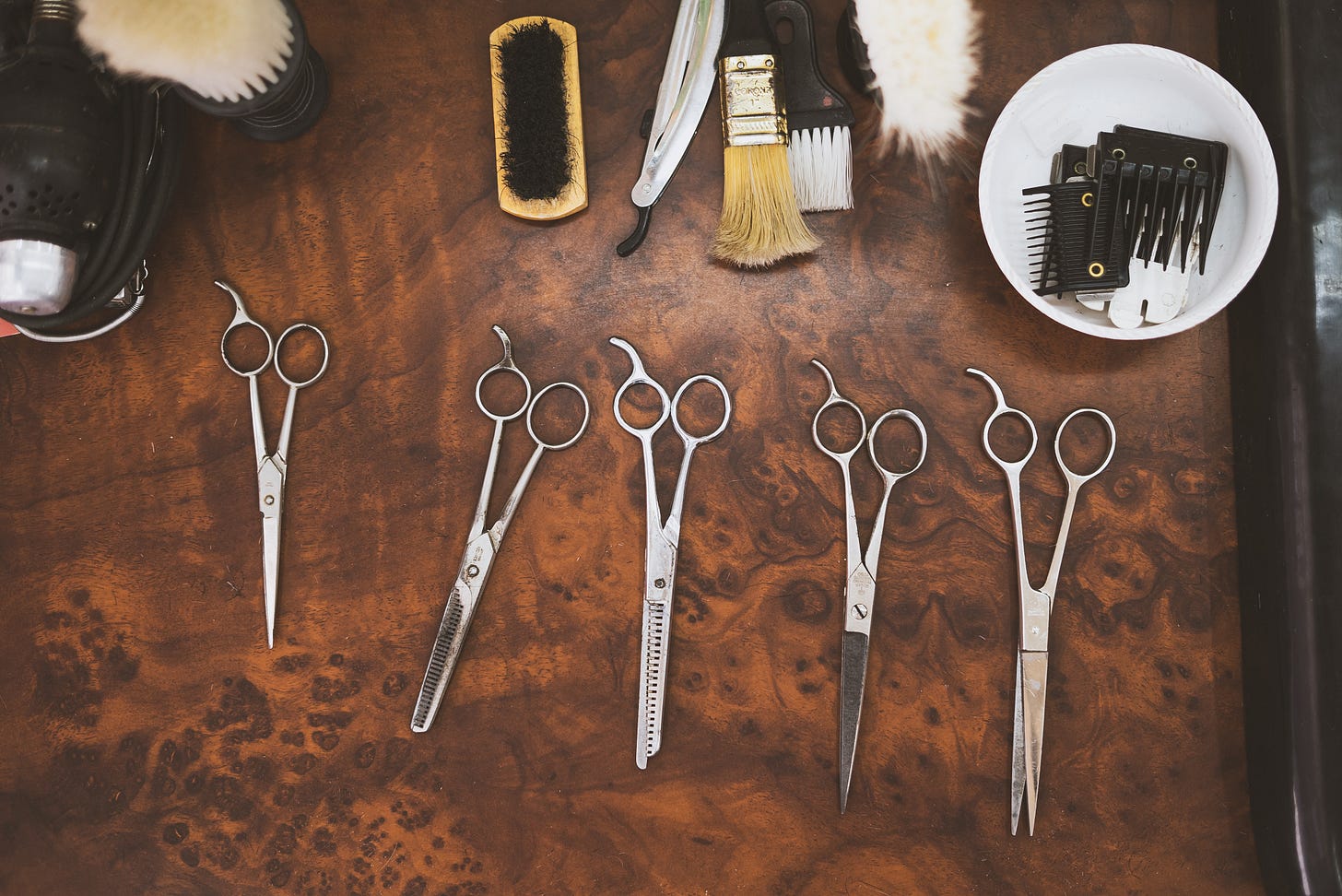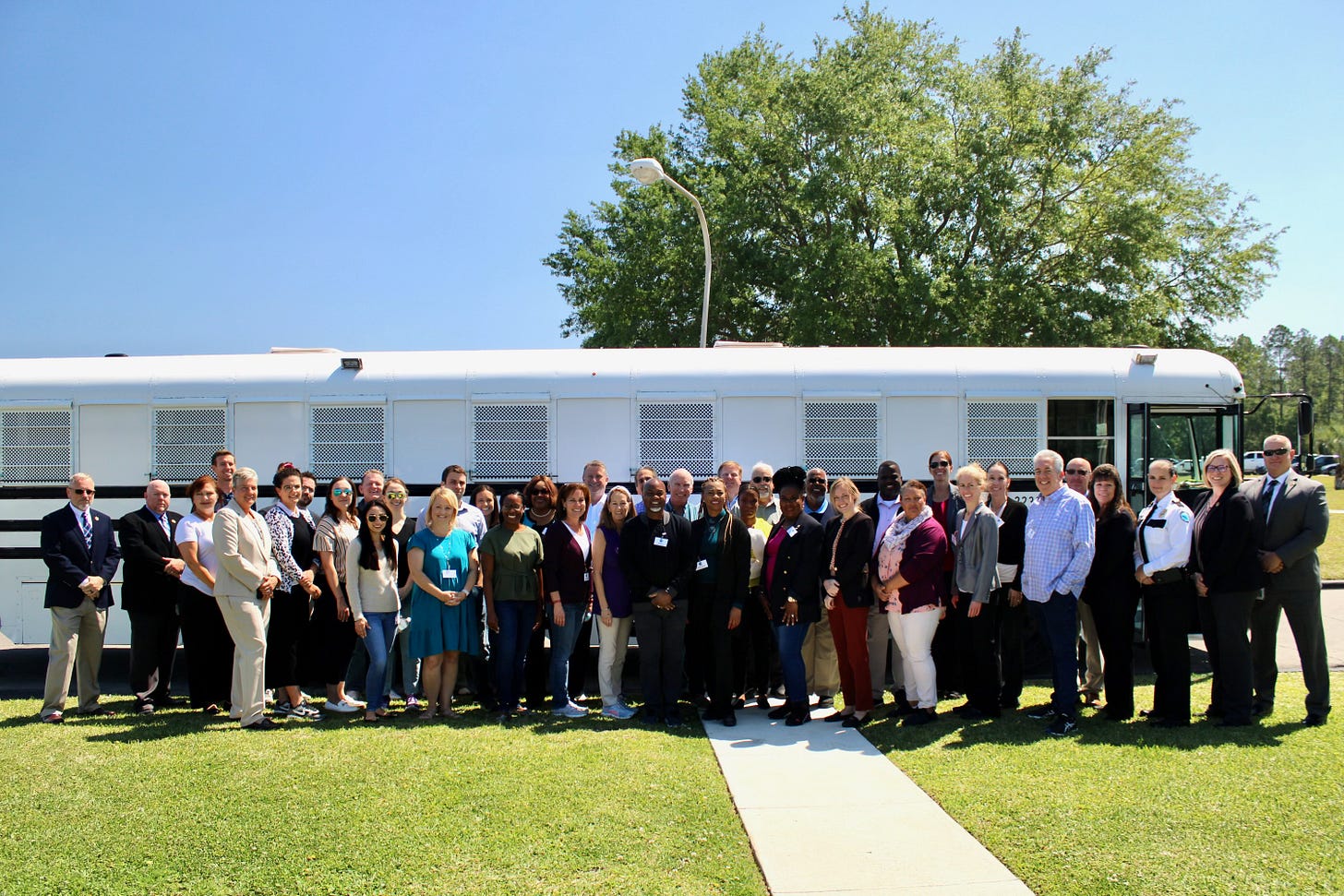Prison Tour, Part II
In this three-part series, I share my experience from the Judge M. Mounts Prison Tour. We visited all levels of prisons in the Florida Department of Corrections--ending at the execution chamber.
Good morning. Sorry for the confusion yesterday. I got a day ahead of myself. The Senate Rules Committee hearing is this morning at 8:30 a.m. It can be accessed here.
Welcome to Part II of III of the Judge Marvin Mounts Prison Tour.
ICYMI, here’s the Preface and Part I of the series.
Over two days, the tour visited six institutions within Florida’s prison system. Throughout the tour, the prisons increased in security. Each of the prisons were generally in the middle of nowhere, away from the neighboring town.
REMINDER: The Senate Rules Committee is hearing the capital sex crime bill at its hearing starting at 8:30 a.m. Watch here.
Women in Prison (Lowell Correctional Institution)
The third stop on the tour was Lowell Correctional Institution in Ocala, Florida. Its capacity is 1,047.
Lowell is Florida’s women’s prison. It houses women in prison for all charges with all sentences, including Florida’s females on death row (currently 3).
Educational/Vocational Programs
Like the male facilities, Lowell also has educational and vocational programs. We visited two.
Culinary Arts
In the culinary arts program, inmates can obtain a certification in culinary arts. The program includes book work and time in the kitchen. They also participate in a competition with other institutions.
I spoke with a woman who is 24. She is serving a 30-year sentence for a crime she committed when she was 17. I do not know what the crime was, but she said that she made a bad choice and surrounded herself with the wrong crowd.
Cosmetology
In the cosmetology program, inmates can become certified just as if they were outside of prison.
Inmates can make appointments for the services offered at the “salon,” including a hair wash, haircut, or manicure. Services that are not offered include pedicures and hair color. For inmates who are performing haircuts, they must checkout the scissors at the beginning of their time in the “salon” and then check them back in at the end.
I spoke with a woman who is 42, although she did not look like it at all. When we walked in, we all thought she had been trained in makeup in the program because her makeup was flawless. It turns out that makeup is not part of the training; she does it herself each morning with what you can buy at the canteen. She said inmates will often experiment with using different products like chalk and colored pencils as makeup because of the limited options, but they are allowed to have makeup in their cells. She’s from California and pays for her family, including her 5 children, to visit her monthly. She’s currently serving a sentence of 25 years for something that happened while vacationing in Miami; I do not know what the crime was.
Pregnant Inmates
There is a specific unit for pregnant women at Lowell. When asked, the warden said that most of the pregnant women come into prison pregnant as opposed to becoming pregnant in prison—although that has happened.
The pregnant prisoners are seen by a OBGYN regularly. The warden said they receive the same type of care as women outside of prison.
Birth
The women are transported to a local hospital to give birth. They are separated from the baby almost immediately (within 24 hours) and return to Lowell as soon as they are cleared by a doctor.
As to the baby, the women who are nearing birth create a “Care Plan” that designates who will take the child after birth—either a family member or adoptive family. That Care Plan is followed after birth.
The baby’s caregivers are able to bring the child to the prison to visit the mother, at the caregiver’s option.
One famous birth at Lowell is Daunte Culpepper. His mother was incarcerated at Lowell for armed robbery when he was born.
Lactation Program
Lowell recently introduced a lactation program to allow women inside the prison who recently gave birth to provide breastmilk for their baby. The women are allowed to pump at the prison and then freeze the breastmilk, which can be picked up by the child’s caregiver once a week. The warden said that the program has so far been successful.
High Turnover
In speaking with one of the officers, I learned that working at Lowell is a difficult job. Others I’ve spoken with since the tour have confirmed. Working with such a diverse population is difficult, and some of the units are not easy. He said there is a high rate of turnover at Lowell, higher than other institutions within DOC. He had been at Lowell for a while, for which he said most people applaud him.
Death Row
As I mentioned above, Lowell houses Florida’s female death row population. We went to that unit on the tour, which also houses the prisoners who have been moved for disciplinary issues.
When I walked in, the building immediately felt different than the other buildings. It was darker than the other buildings and had a vestibule in the center for officers to supervise. All around were single cells with steel doors.
Death row is upstairs; there are 6 cells. Currently, there are 3 women on Florida’s death row. They are in single cells with solid steel doors that have small windows. We were able to speak to the women through the windows, although it was difficult to hear them.
Reception and Medical Center (RMC)
RMC is located in Lake Butler, Florida. Its capacity is 1,503.
As the name suggests, RMC has two main missions: reception and medical.
Reception
RMC is one of several reception centers within the DOC system. It is an all-male reception facility.1 This is where men, after being sentenced to longer than 1 year and 1 day, are brought from the county jails to be processed by DOC into the prison system. They are not allowed to talk during the reception process; "NO Talking" is painted across the wall.
Upon arrival, the bus pulls into a closed garage-type area that leads into the building. The men are required to strip and are then searched. This is done in a group. There is a urinal and toilet in the hallway without doors/stalls.
NOTE: When a man sentenced to death row, he is kept separate from the others with additional security.
After getting dressed in the new clothes provided, the prisoners sit in a waiting room on benches—again, no talking allowed. If someone cannot cooperate in the group setting, he will be separated. When we were there, one man was in a cage in the hallway. We were told he had to be separated from the group.
On the first day or so upon arrival, the prisoner goes through various procedures—fingerprints, DNA swabs, receiving his ID card, a mandatory hair cut and face shave, bloodwork, etc. DOC also processes his property, which can either be mailed home, donated, or thrown away.
NOTE: If he refuses the haircut for any reason, including religious reasons, the prisoner will be subject to disciplinary processes (which would restart the clock for qualifying for the IP discussed in Part I). Ultimately, the prisoner will be required to comply. We were told this is for hygiene reasons; once in prison, we were told that men can grow out their hair/beard if desired. Since the tour, I have asked DOC whether the same requirement applies to women; I was told that “[f]emale inmates are not required to cut their hair.”
Over the next few weeks, the men will go through several processes and ultimately be assigned and transported to an institution. Women go through a similar process.
Medical
Also at RMC are various medical providers, including for men in tthe DOC system with chronic and terminal illness.
RMC also has the only hospital on prison grounds in the DOC system. Like the mental health treatment at Lake, it is staffed and run by Centurion. They staff the hospital with doctors, nurses, etc. They have x-ray machines, surgery centers, etc.
We walked down one of the wings in the hospital and saw several of the prisoners in the hospital through the windows of the doors to their rooms. One man yelled at us for looking into his room; I can’t say I blame him.
The women’s reception center, which we did not tour, is located across the street from Lowell.






Fascinating and important piece. Compelling interviews. Truly great work. Made me slow down and want to catch every word. Thank you for doing the tour and describing your experience.